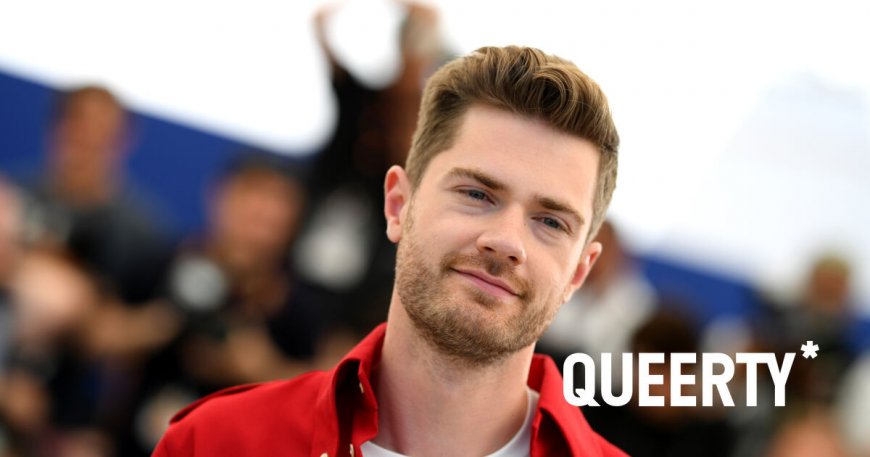Lukas Dhont is the talented gay filmmaker behind the Oscar nominee that has us all in tears
The director hopes his Oscar-nominated film 'Close" will start a dialogue about "epidemic of loneliness when it comes to masculinity."


From “U-haul lesbian” conductors to a multi-verse hopping queer anti-hero, this year’s crop of Oscar-nominated movies is pretty gay!
Unfortunately, that didn’t necessarily result in more nominations for LGBTQ+ talent, which feels like a let-down just a year after Ariana DeBose made history as the first queer woman of color to win an Academy Award for her work in West Side Story.
But one place we were pleased to see some queer representation was in the Best International Film category, which recognized the heartbreaking coming-of-age drama Close from gay Belgian filmmaker Lukas Dhont.
The film earns Dhont his first-ever Oscar nomination, but, at 31, the writer-director has already made a name for himself in international cinema. In other words, this probably won’t be the last time you hear the Academy call his name.
Born in 1991 in Ghent—the third largest city in Belgium—Dhont’s first foray into the film world came as a teenager when his mother (a fashion teacher) helped him find work as a costume design assistant on Belgian movie productions.
Despite the support of his loving mother and those positive work experiences, he doesn’t look back fondly on his adolescence:
“We live in a society where boys are expected to behave a certain way, girls are expected to behave a certain way,” he told The Brussels Times. “[It’s based] on straight sexual identity. And so, for me, 20 years ago, even though my environment was all right, I felt like a monster.”
Those childhood feelings of not belonging have been an integral part of both of Dhont’s feature-length films thus far. His first, Girl, is about a teenaged trans girl training to be a ballerina while undergoing her transition. The film premiered at the Cannes Film Festival in 2018, where it won the Queer Palm and earned the filmmaker the Caméra d’Or award for best first feature.
However, the film did receive its fair share of criticism, both for its depiction of “unforgivable” physical harm, and because the trans lead was played by young cisgender male actor Victor Polster.
In reflecting on the controversies with Vanity Fair, Dhont has said the pushback has helped him grow as an artist and opened up an important dialogue:
“I realized that there’s so little trans representation already onscreen,” he shared. “There’s still so many experiences to show, to tell. I don’t know if they’re mine to do that, but I feel like what I really understood and learned is that we need to have this visibility, and we need to have people who went through that experience also talk about it.”
Dhont now hopes his follow-up film, Close, will start an important dialogue of its own. It comes from a very personal place, exploring a time in his life when he distanced himself from male friends out of fear of intimacy, with the intent of finding “a cinematic translation for this epidemic of loneliness when it comes to masculinity.”
At the outset, we meet two thirteen-year old boys, Léo (Eden Dambrine) and Rémi (Gustav De Waele) enjoying their last days of summer. As the film’s title would suggest, they share a very intimate yet innocent friendship, not uncommon at that age, but it all gradually starts to change once the school year begins and the classmates take notice of their friendship—even asking if they’re boyfriends.
Echoing Dhont’s own memories of distancing himself from friends, we see the more popular Léo begin to put up walls with Rémi, hampering their connection, which leads to a fallout no one saw coming.
Admittedly, Close can be a tough watch, but it’s an undeniable achievement in filmmaking anchored by its young actors, delivering performances that would be astounding at any age. Critics have hailed the “elegant, beautiful, moving” film and called it “heart-crushing but emotionally rich.”
Like Girl, Close also premiered at Cannes where it won the Grand Prix honor (essentially second place) this past year. Now, the film—along with Dhont—are headed to the Oscars on March 12.
The filmmaker tells People that the nomination is the fulfillment of a childhood dream, and that he feels both privileged and honored to be in the conversation: “It kind of made me reflect on just all the beauty and the art out there of the people out there that do not get that sort of platform.”
And, on the topic of awards honors, Lukas Dhont’s Close is among the 10 Queerties nominees for best Indie Movie. You can vote for the film below, and support all of your faves here, now through February 21.
Close is now playing in select theaters in the U.S., and is headed to cinemas across Latin America and the UK beginning March 3.

 Mark
Mark 





